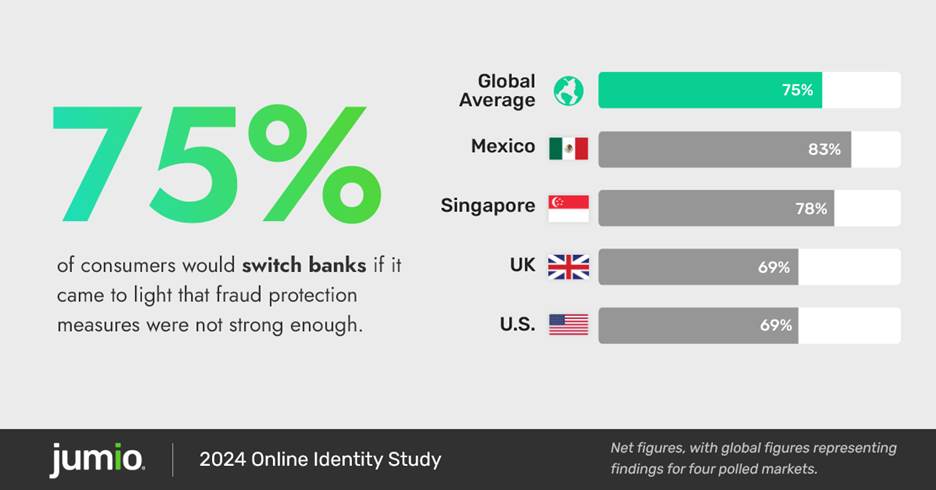Identity verification firm Jumio has revealed that consumers are placing more and more attention on banks’ ability to protect them from various fraud attacks.
In its annual Online Identity Study, the 2024 edition outlined that 75% of respondents would switch banking providers if their fraud prevention tools were insufficient.
Jumio’s study examined the views of more than 8,000 adult consumers, split evenly across the UK, US, Singapore, and Mexico. The data revealed that 75% of consumers feel their banking service provider bears ultimate responsibility for protecting them against cybercrime and fraud.
The report highlights a growing anxiety over new and emerging fraud threats, from the increasing presence of authorised push payment (APP) fraud, to deepfake and other AI-related fraud.
Banks have long had to deal with impersonation fraud. But as deepfakes and voice cloning become more sophisticated, schemes in which scammers pretend to be anything from a prospective romantic partner to a family member in crisis, have the potential to target far more people and with a higher rate of success.

Anna Convery, Jumio CMO, commented on the findings: “This data should be a wake-up call to banks and financial institutions, your customers will take their business elsewhere if you don’t protect them from fraud. As cybercriminals become more savvy with their tactics, it’s essential to fight AI with AI.
“Banks must implement multimodal, biometric-based verification systems that layer in liveness detection and other advanced technologies to stop deepfakes, detect camera injection and presentation attacks, and prevent stolen personal information from being used.”
The rise and ultimate explosion of AI-related fraud attacks continues to be an increasing worry for banks and financial services alike.
Jumio is not alone in its assessment of the rising threat, with a recent Signicat report making a damning statement that operators are not prepared for the oncoming surge in deepfake attacks.
Signicat attributes this to a myriad of factors, such as a lack of understanding of when an AI-related fraud attack is happening, combined with the lack of infrastructure and talent to prevent it from happening.
This has filtered through to customer worries, with Jumio revealing that fear of deepfake’s are at an “all-time high”. More than two-thirds of respondents to its study are concerned whether their bank is doing enough to protect customers from deepfake fraud, with 69% demanding stronger measures to be put in place.
Additionally, three-quarters of consumers (75%) expect a full refund from their bank if they are the victim of cybercrime.
But with the rise in customer and institutional trepidation, there are operators in the field that are working on solutions to combat the looming threat.
Veridas, a digital identity verification company, delivered a keynote at Money 20/20 Europe to reveal what they are working on to combat speech and facial fraud, as well as engaging the audience to inform them of how hard it is to recognise.























